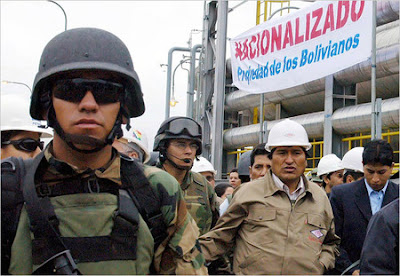By Oscar Olivera Foronda, Marcelo Rojas, Abraham Grandydier, Aniceto Hinojosa Vásquez and Carlos Oropeza
Bolivia
Over Christmas weekend, the government of President Evo Morales removed a national gas subsidy, causing transport fuel costs to rise more than 80 percent overnight, from $1.97/gallon to $3.42/gallon. The government pledged to counter the increase with public wage increases and a freeze on home utility bills, and said that the policy would save the country $380 million a year and put gas prices in line with neighboring Latin American countries.
Nevertheless, the response from Bolivian society was vocal and militant: Bolivian media called the policy change the “Gasolinazo,” or “The Big Gasoline Hit;” the gasolinazo led to an immediate mobilization by the country’s social movements. The main transportation union in the country called for ‘an indefinite strike’; teachers, miners, and many other sectors responded similarly.
In a New Year’s Eve message to the nation President Morales said he had listened to the unions and social organizations, and had decided to rescind the decree.
Within the international climate justice movement, the Bolivian government has taken strong leadership in pushing a principled position on emissions reductions and rights-based climate solutions; in Copenhagen and Cancun, Morales’ position was firm, and has come to represent the very aspirations of social movements worldwide. Yet, in domestic policy, Bolivia is pursuing an industrial growth strategy that very much contradicts its international concerns, and threatens the very human and natural rights it claims to defend.
In an article on Counterpunch published at the moment of the gasolinazo, Chellis Glendinning, writing from Cochabamba, lays out the contradictions by quoting two prominent Bolivian social movement activists: “Cochabamba’s Water War leader Oscar Olivera holds to the notion that true power resides ‘in the plaza, not in the palace,’ while his sister, water activist Marcela Olivera, claims she is witness to two different Evo Morales’: the one who makes international eco-proclamations and the one, at home, who is pushing dams, uranium excavation, cell towers, and mega-highways.
These contradictions present a tremendous challenge to those organizations and individuals who want to support Bolivia’s international stance while at the same time recognizing that the truth in the streets is quite different. At the same time, these are precisely the contradictions that must be faced in developing equitable path forward for climate justice.
More important, perhaps, than simply leveling charges of hypocrisy or abuse of power, is to recognize that these contradictions are at the very heart of the questions confronting the climate justice movement: what is the role of the state, given that states are almost inevitably beholden to global finance and an industrial paradigm of development? What is the relation between global policy proclamations and the real needs of the social majorities? How do we reduce dependence on fossil fuels and extractive industries while advancing a just transition that meets the needs of the most vulnerable first and foremost?
The following Open Letter to Evo Morales and Álvaro García was published after the Gasolinazo and before the repeal of the decree, and gives a strong sense of the tensions that exist between Bolivia’s social movements and its government.

No comments:
Post a Comment